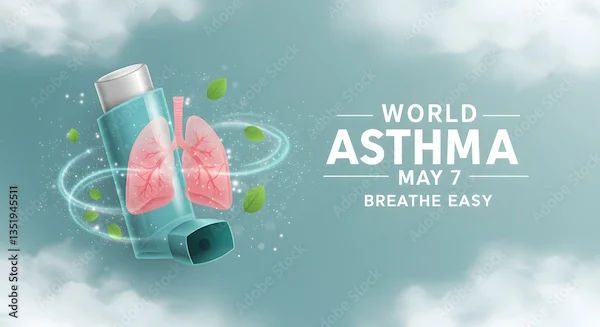Asthma Triggers to Be Aware Of
Discover common asthma triggers such as allergens, pollutants, exercise, and weather changes. Learn how to identify and avoid these triggers to better manage asthma symptoms and prevent flare-ups.

Written by Dr. Rohinipriyanka Pondugula
Reviewed by Dr. Shaik Abdul Kalam MD (Physician)
Last updated on 24th Aug, 2025

Asthma is a chronic respiratory condition that affects millions of people worldwide. It causes inflammation and narrowing of the airways, leading to symptoms like wheezing, shortness of breath, chest tightness, and coughing. While asthma can be managed with medications, avoiding triggers is crucial to preventing flare-ups.
Understanding what triggers your asthma can help you stay symptom-free and improve your quality of life. Here’s a guide to common asthma triggers and how to manage them.
Common Asthma Triggers
Below are a few common triggers,
1. Allergens
Allergens are substances that cause allergic reactions, which can worsen asthma symptoms. Common allergens include:
- Pollen (from trees, grass, and weeds)
- Dust mites (tiny bugs found in bedding, carpets, and upholstery)
- Pet dander (skin flakes, saliva, or urine from cats, dogs, and other animals)
- Mold spores (found in damp areas like bathrooms and basements)
- Cockroach droppings
How to manage:
- Keep windows closed during high pollen seasons.
- Use allergen-proof mattress and pillow covers.
- Wash bedding weekly in hot water.
- Vacuum frequently with a HEPA filter vacuum.
- Keep pets out of the bedroom if you’re allergic.
- Fix leaks to prevent mold growth.
Consult a Top Pulmonologist
2. Air Pollution & Irritants
Pollutants in the air can irritate your airways and trigger asthma symptoms. Common irritants include:
- Cigarette smoke (firsthand or secondhand)
- Vehicle exhaust fumes
- Strong odors (perfumes, cleaning products, air fresheners)
- Industrial fumes & chemicals
How to manage:
- Avoid smoking and secondhand smoke.
- Stay indoors on high-pollution days.
- Use fragrance-free or mild cleaning products.
- Ensure proper ventilation when using chemicals.
3. Respiratory Infections
Colds, flu, sinus infections, and other respiratory illnesses can inflame the airways and worsen asthma.
How to manage:
- Wash hands frequently to prevent infections.
- Get vaccinated for flu and pneumonia (consult your doctor).
- Avoid close contact with sick people.
- Use a humidifier to keep air moist (but clean it regularly to prevent mold).
4. Weather Changes
Extreme weather conditions can trigger asthma, including:
- Cold, dry air (can irritate airways)
- Hot, humid air (can increase mold growth)
- Thunderstorms (can stir up pollen)
How to manage:
- Wear a scarf over your nose and mouth in cold weather.
- Stay indoors during extreme weather.
- Use an air conditioner to regulate indoor humidity.
5. Exercise (Exercise-Induced Asthma)
Physical activity can sometimes trigger asthma symptoms, especially in cold or dry air.
How to manage:
- Warm up before exercising.
- Choose indoor workouts in cold weather.
- Use your inhaler before exercise (if prescribed).
- Opt for swimming (moist air is less likely to trigger asthma).
6. Stress & Strong Emotions
Stress, anxiety, and even excessive laughter or crying can lead to rapid breathing and trigger asthma.
How to manage:
- Practice relaxation techniques (deep breathing, meditation, yoga).
- Get enough sleep to reduce stress.
- Seek counseling if emotional stress is affecting your asthma.
7. Certain Medications
Some medicines can worsen asthma, including:
- Aspirin & NSAIDs (ibuprofen, naproxen)
- Beta-blockers (used for high blood pressure)
How to manage:
- Always inform your doctor about your asthma before taking new medications.
- Use alternatives like acetaminophen (paracetamol) for pain relief.
8. Food Additives & Preservatives
Certain food additives, like sulfites (found in wine, dried fruits, and processed foods), can trigger asthma in some people.
How to manage:
- Read food labels carefully.
- Avoid foods that trigger symptoms.
How to Identify Your Asthma Triggers
Since triggers vary from person to person, keeping an asthma diary can help:
- Note when symptoms occur.
- Record possible triggers (weather, food, activities).
Share this with your doctor for better management.
When to Seek Medical Help
If your asthma symptoms worsen despite avoiding triggers, consult a doctor. Seek emergency care if you experience:
- Severe shortness of breath
- Blue lips or fingernails
- Difficulty speaking due to breathing problems
Final Tips for Managing Asthma
- Take prescribed medications regularly.
- Keep your rescue inhaler handy.
- Stay active but avoid known triggers.
- Get regular check-ups with your doctor.
If you need personalized advice, consider booking a consultation with an asthma specialist through Apollo 24|7. Early diagnosis and proper management can help you lead a healthy, active life.
Final Thoughts
Identifying and understanding asthma triggers is a crucial part of effective asthma management. By recognizing what causes flare-ups whether it's allergens, exercise, environmental changes, or infections you can take proactive steps to avoid or minimize exposure.
Consult a Top Pulmonologist
Consult a Top Pulmonologist
Dr. Naseeha Mohammed S V
Pulmonology Respiratory Medicine Specialist
6 Years • MBBS, MD ,DNB Respiratory Medicine
Bengaluru
Apollo Clinic, Sarjapur Road, Bengaluru

Dr. Amrutha G
General Physician/ Internal Medicine Specialist
10 Years • MBBS,DNB(family medicine), Diabetologist-CCEBDM,CCGDM
Bengaluru
Apollo Clinic, Sarjapur Road, Bengaluru

Dr Ahmed Sayeed
General Physician/ Internal Medicine Specialist
26 Years • MBBS, M.D (GENERAL MEDICINE), MRCP (UK)
Bengaluru
Apollo Clinic, JP nagar, Bengaluru
(25+ Patients)

Dr Vishwa Vijeth K.
Pulmonology Respiratory Medicine Specialist
8 Years • MBBS, MD ( Respiratory Medicine)
Bangalore
Apollo Clinic Bellandur, Bangalore

Dr. Krishna Ramanathan
Ent Specialist
10 Years • MBBS DNB
Bengaluru
Apollo Clinic, JP nagar, Bengaluru
Consult a Top Pulmonologist
Dr. Naseeha Mohammed S V
Pulmonology Respiratory Medicine Specialist
6 Years • MBBS, MD ,DNB Respiratory Medicine
Bengaluru
Apollo Clinic, Sarjapur Road, Bengaluru

Dr. Amrutha G
General Physician/ Internal Medicine Specialist
10 Years • MBBS,DNB(family medicine), Diabetologist-CCEBDM,CCGDM
Bengaluru
Apollo Clinic, Sarjapur Road, Bengaluru

Dr Ahmed Sayeed
General Physician/ Internal Medicine Specialist
26 Years • MBBS, M.D (GENERAL MEDICINE), MRCP (UK)
Bengaluru
Apollo Clinic, JP nagar, Bengaluru
(25+ Patients)

Dr Vishwa Vijeth K.
Pulmonology Respiratory Medicine Specialist
8 Years • MBBS, MD ( Respiratory Medicine)
Bangalore
Apollo Clinic Bellandur, Bangalore

Dr. Krishna Ramanathan
Ent Specialist
10 Years • MBBS DNB
Bengaluru
Apollo Clinic, JP nagar, Bengaluru
.webp)



